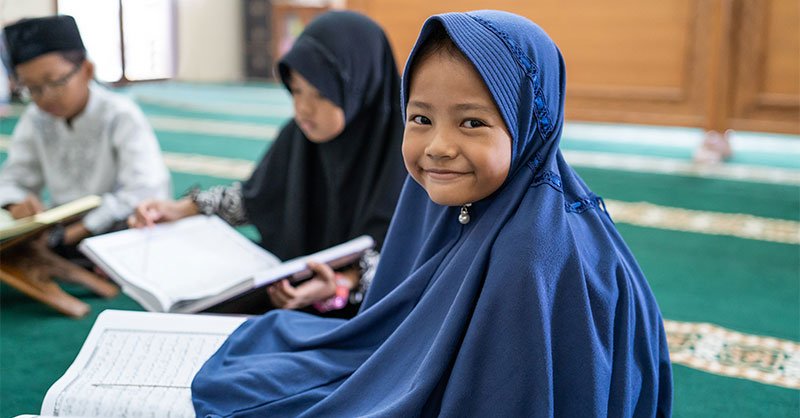
Are you struggling to connect with your teenage sons and daughters? Managing this critical stage in their lives can be challenging, as they face new emotions, pressures, and questions about their identity. As a parent, it’s your responsibility to guide them effectively, helping them understand themselves, manage their emotions, and stay on the right path. This pivotal stage is the perfect opportunity to lay a strong foundation and nurture their Islamic identity, setting them up for a life of faith, knowledge, and purpose.
A view on Muslim Teens Struggles:
The teenage years are often described as a turbulent period known by rapid physical, emotional, and social changes. Adolescents struggle with questions about their identity, values, and future while facing increasing external pressure. For Muslim teens, this stage can be even more challenging as they navigate the balance between their faith and the influences of modernity.
1. Emotional and Mental Health
Studies show that mental health issues are on the rise among teenagers worldwide. According to the World Health Organization (WHO), depression is one of the leading causes of illness and disability among adolescents. Additionally, a survey by the Pew Research Center found that 70% of teens view anxiety and depression as major problems among their peers. This highlights the emotional struggles many teens face, often amplified by societal expectations and peer pressure.
2. Identity and Belonging
Teenage is a critical time for self-discovery, and Muslim teens may feel conflicted between their cultural and religious identity and the norms of the society they live in. A 2018 study by the Institute for Social Policy and Understanding (ISPU) found that 42% of Muslim youth reported experiencing religious discrimination, which can impact their self-esteem and sense of belonging.
3. Social Media and Peer Influence
The rise of social media has introduced new pressures for teens. Research indicates that 95% of teenagers own a smartphone, and 89% are active on at least one social media platform. Constant exposure to others' unreal lives and unrealistic beauty standards can lead to feelings of envy and dissatisfaction. For Muslim teens, this can create additional challenges in upholding Islamic values in a highly connected digital world.
4. Physical Changes and Hormonal Shifts
Puberty brings significant physical and hormonal changes, which can affect teens’ emotions and behavior. These changes, coupled with the need for parental guidance, make this a pivotal time for teaching self-discipline, modesty, and the principles of Islam.
Practical tips for Muslim parents to deal with their teens:
1. Strengthen Connection with Islam
Help them form their identities. Instead of just enforcing rules, help them understand the why behind Islamic teachings. Introduce books, enroll them in Islamic academies, recommend youth-friendly da‘is, and open discussions on relevant topics like self-identity, mental health, and social issues. Be their role model, as teens often imitate what they observe at home. Show them how your Islamic values—such as kindness, patience, and honesty—are practiced in daily life. Allah the Al-mighty said, “Bid your people to pray, and be diligent in ˹observing˺ it. We do not ask you to provide. It is We Who provide for you. And the ultimate outcome is ˹only˺ for ˹the people of˺ righteousness.” (20:132)
2. Communicate effectively:
Let your teens express their opinions, doubts, and struggles without fear of judgment or punishment. Be a good listener and provide thoughtful responses. Allah said, “ Invite ˹all˺ to the Way of your Lord with wisdom and kind advice, and only debate with them in the best manner.” ( 16:125)
This beautiful verse reminds us of the importance of using wisdom, kindness, and patience when inviting others to Islam. As parents, it is vital to remember that your sons and daughters are the most important individuals to whom you make da‘wah. They are entrusted to you, and guiding them with love, compassion, and wisdom is your duty.
Show them the beauty of Islam not just through words, but through your actions. When you approach them with understanding and care, it fosters a strong bond and makes them deeply attached to the Islamic teachings. Always remember, da‘wah begins at home, and the best way to guide your children is through sincerity, respect, and a role modeling.
3. Build Trust and Independence
Guide your teens to make choices within Islamic boundaries rather than imposing strict control. This approach builds their confidence and accountability. Additionally, give them responsibilities both inside and outside the home to prepare them for various situations and help them grow into responsible individuals. As the Prophet Muhammad (peace be upon him) said, "Each of you is a shepherd, and each of you is responsible for his flock" (Sahih Bukhari, Sahih Muslim). It is the duty of parents to model and teach them how to bear their responsibilities with wisdom and integrity.
4. Adopt them to Discipline
To instill discipline in teens, it’s essential to adopt a clear, consistent, and loving approach that aligns with Islamic values. Show them what Islamic discipline looks like in your actions, such as punctual prayer, modesty, honesty, and patience. Actions are often more impactful than words. Also demonstrate self-restraint when facing temptations or challenges. Discuss the wisdom behind Islamic boundaries, such as avoiding haram actions or adhering to modesty. For example, explain how prayer connects us to Allah, fosters discipline, and brings peace. Share stories from the Quran or Hadith that highlight the benefits of following Islamic teachings.
Teach them to evaluate their own actions regularly. Ask questions like, “Did I make choices today that pleased Allah?”
Help them understand that discipline is a personal responsibility, and they will one day guide their own families toward righteousness.
5. Engage Them in Community and Activities
Encourage participation in Islamic youth programs or halaqas where they can connect with like-minded peers. Help them explore interests like sports, arts, or volunteer work, fostering both personal growth and social responsibility. A study found that 64% of young people involved in faith-based activities reported feeling a stronger sense of purpose and moral direction.
6. Stay Patient and Make Dua
Always remember that teenage is a transformative time for them, filled with questions and challenges. Islam emphasizes the great reward for raising and guiding children, not only to become good Muslims but also responsible and kind human beings. The Prophet Muhammad (ﷺ) said: "When a man dies, his deeds come to an end except for three things: ongoing charity, beneficial knowledge, or a righteous child who prays for him."
This hadith highlights the everlasting benefit of raising righteous children who live by Islamic values. Patience during their growth and struggles is rewarded immensely, as guiding them is not just an act of parenting but also a form of worship. Regularly make dua for their success, faith, and well-being. Trust in Allah’s plan for their development.
TAJ Al-Quran teens course:
TAJ specifies a special course for teens to show them the guidelines of the true Muslim they should be. Why a special course for teens?
Teenagers of today are the youth of the future. So it is our responsibility to build their characters and to make them good Muslims who are able to represent Islam in the proper way.
In this course our teens are going to learn the following:
• Contemplation, recitation, and memorization of the Holy Quran. Teens are going to study the Quranic ethics like: Luqman's advice to his son, and the story of lady Mariem, her chastity, patience and submission to Allah's will.
• Studying Fiqh of purification
covering the 'awrah ( intimate parts), the value of hayaa', the value of chivalry.
• And the most important part in this course is building teens' self-awareness. Helping them to understand their emotions and how to manage them, enhancing their skills as well as understanding the meaning of maturity and how to go through it.
• Teens will enjoy their time making arts and crafts besides building their own future.
Join us now and provide your teens with a healthy, knowledge atmosphere.
Comments (0)
Categories
Recent posts


Little Hearts, Big Faith: Why Quran ...
18 Dec 2024
Arabic: The Language That Empowers ...
19 Dec 2024
How Technology is Revolutionizing Quran ...
3 Nov 2025



